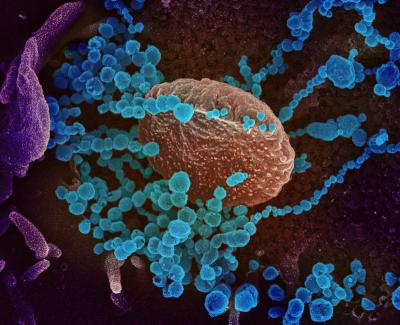By Jeanne M. Marrazzo, M.D., M.P.H., Director, NIAID, and Julie L. Gerberding, M.D., M.P.H., CEO, Foundation for the National Institutes of Health (FNIH)
On Nov. 21, NIAID and the Foundation for the National Institutes of Health (FNIH) launched its first in a series of online webinars highlighting recent progress in the new Researching COVID to Enhance Recovery - Treating Long COVID (RECOVER-TLC) program. More than 800 patients, advocates, care providers, and scientists from academia and life sciences companies were on hand for the inaugural webinar. Those unable to attend the webinar can access the recording here.
The purpose of this webinar series is to provide brief updates on the progress of RECOVER-TLC, review recent Long COVID-related scientific advances, and offer a forum for asking questions and sharing concerns, ideas, and comments. During the Nov. webinar, Joe Breen, Ph.D., chief of NIAID’s Immunoregulation Section in the Division of Allergy, Immunology and Transplantation, highlighted recent RECOVER-TLC activities that have occurred since the program’s scientific workshop in September, including:
- Establishment of a new Web-based portal for submitting suggested therapeutics and biologics for potential clinical testing in RECOVER-TLC;
- Development of an intervention prioritization process and establishment of specialized working groups, including members with relevant expertise, to prioritize these submissions; and
- NIAID’s issuance of a Request for Information (RFI) seeking: input on potential Long COVID therapeutics; working group involvement from patients, health care providers, scientists and clinicians; suggestions for potential biomarkers/endpoints for future RECOVER-TLC clinical trials and general feedback about the RECOVER-TLC initiative. The RFI is open for comment until Feb. 1, 2025.
Elizabeth Geerling, Ph.D., FNIH Associate Project Manager, Translational Science reported during the webinar that to date, there have been more than 300 submissions to the RECOVER-TLC interventions portal, including potential drugs, therapeutic agents, biologics, nutrition and dietary agents, and other intervention types. More than 70% of these submissions came from patients and providers with the remainder from researchers and biopharmaceutical companies. We were glad that Webinar participants took advantage of the question-and-answer session to offer comments, concerns and ideas for RECOVER-TLC. Your input is vital to the success of the program.
In December, NIAID, along with the National Heart, Lung and Blood Institute (NHLBI) and the National Institute of Neurological Disorders and Stroke (NINDS), will announce 20 new awards to fund RECOVER pathobiology projects. Critical findings from these projects will inform the RECOVER-TLC treatment studies. Additionally, next month, NIAID and FNIH will begin distributing an online monthly newsletter sharing the latest RECOVER-TLC activities.
We expect to host the next RECOVER-TLC webinar in early January 2025. Until then, please continue to use the links in the RFI to share suggestions for potential agents for testing, volunteer to participate in our working groups, and provide us with general feedback on the RECOVER-TLC program.
Thank you in advance for your interest in this critical health condition as we move forward to achieve our collective goal of rapidly bringing safe and effective treatments to all those affected by Long COVID.


